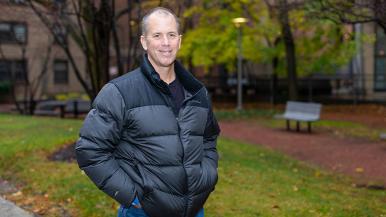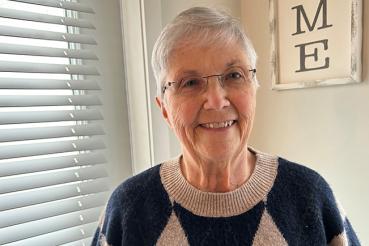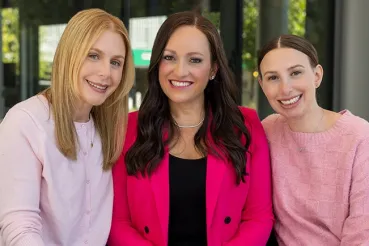For 28 years, Mark Owsianiak was fighting fires and protecting the community as a part of the Chicago Fire Department. He was enjoying retirement until he started experiencing significant pain in his stomach.
“Initially I thought the pain was because of the food I was eating,” Owsianiak says. “But it became progressively worse to the point where I had trouble sleeping each night.”
In November 2019, Owsianiak made an appointment with Rush gastroenterologist Michael Brown, MD, who ultimately performed an upper endoscopy — a procedure used to look at the inner lining of the esophagus, stomach and small intestine.
Although the procedure was successful, it did not determine the cause of Owsianiak’s pain. He decided to talk with his primary care physician, who ordered an ultrasound. The results showed a mass in his pancreas, which would later confirm his diagnosis of pancreatic cancer.
“It wasn't really a shock because my father had pancreatic cancer, and in a way, I felt prepared for it,” he says. “It became a matter of, ‘OK, what do we need to do to treat it?’”
Treatment during a pandemic
Amid the COVID-19 pandemic, Owsianiak began treatment with Audrey Kam, MD, a medical oncologist at RUSH MD Anderson Cancer Center, who treated him with eight rounds of chemotherapy.
“I was uncertain of how quickly my cancer would progress, and I felt confident in Rush's safety measures, so I continued my care,” he says.
After 28 treatments of radiation under the care of Thomas Kim, MD, a radiation oncologist at RUSH MD Anderson, Owsianiak had the opportunity to ring the bell in the Department of Radiation Oncology — a way to celebrate his final day of treatment.
"As firefighters, we ring bells for various reasons, and when I rang the bell at Rush, it reminded me of the experiences I shared in the fire department," Owsianiak says. "And I was grateful to have my family, care team and even a few first responders stop by to help me celebrate this special moment in my recovery."
Understanding the cause
While receiving treatment, Owsianiak’s care team encouraged him to undergo genetic testing to confirm if his cancer was due to hereditary predispositions, which accounts for approximately 5 to 10% of all cancers.
“I wanted to understand the cause of my cancer but also to see if my daughters and their children are at risk and need to get tested — that was particularly important to me,” Owsianiak says.
After a blood test, the results came back negative for a cancerous gene.
“It felt good to know that it’s not in my family, and that it’s probably more attributed to my line of work,” he says.
Research shows that firefighters face a 9% increase in cancer diagnoses compared to the general population in the U.S.
“As a firefighter, it’s important to engage in safety precautions — like wearing your breathing apparatus and washing your clothes and body after every working fire,” he says. “Because the statistics are real, and I’m a testament to that.”
A life-changing surgery
In October 2020, Owsianiak found out that he was a candidate for the Whipple procedure — a complex operation that involves removing part of the pancreas where the tumor is located, a portion of the small intestine, the gallbladder and bile duct.
“We’re lucky to have found Mark’s cancer in its early stages and when it had not metastasized, so we could proceed with the operation, and remove all of his cancer,” says Sam Pappas, MD, a surgical oncologist at RUSH MD Anderson.
After the procedure and follow up tests, Owsianiak recovered from the surgery and is doing well. His care team will continue to monitor him for a potential reoccurrence.
“I had heard good things about Dr. Pappas, so I was very confident that things were going to work out well,” he says.
Message to others
After his experience with cancer, Owsianiak shares this message to other survivors, including fellow firefighters with cancer:
“Stay strong and committed to the process. It can be tough sometimes but hang in there. It's all about taking care of yourself, so you can live longer and protect the health of you and your family.”




